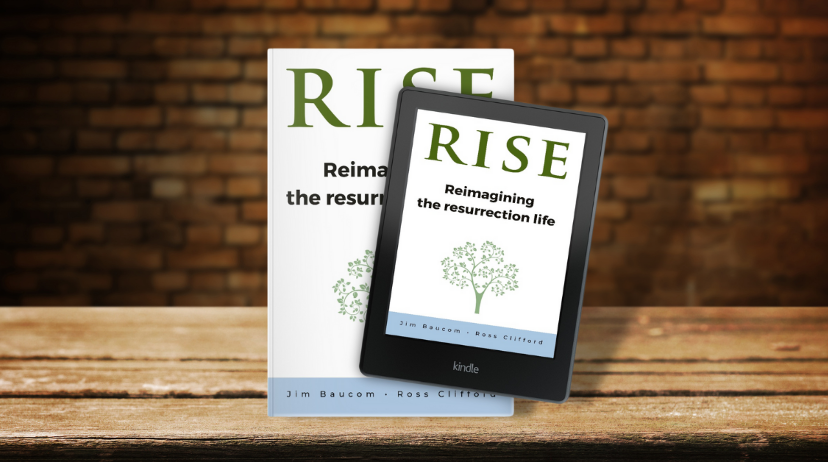It's Easter Sunday and children are running around searching for colourful little eggs filled with lollies and bunnies. People dressed in casual apparel as they attend mass or Sunday morning services, or gather around and click a zoom link, with their loved ones. It's a day that people are more open to "religion" or this story of a dead man rising.
For many, Easter Sunday is just another church service, for others, it is a major event on the church calendar: what if both of these fail to fully grasp the reality of what took place over 2000 years ago?
In Rise: Reimagining the resurrection life, Ross Clifford and Jim Baucom seek to explore and challenge the neat boxes we have placed around resurrection living arguing that to truly understand and live the resurrection life is to partake in a revolution.
Rise reads as a more accessible reading of Clifford's last work on resurrection theology. Rise provides eight practical steps to reimagine and reorient around the Resurrection. From Genesis 1-2 to postmodern Spirituality each chapter guides one through the four phases of creation, fall, resurrection and redemption.
A NEW WAY TO WORK
A common question people ask today is “What do you do?” Work and job titles have become a social status and a primary identity, an idol.
In the Garden work was an innate and divine invitation to turn raw resources into something tangible and resourceful. Work was a divinely inspired creative endeavour. “Work in the garden was a place for the potter, the shepherd, and the builder, for practical, creative, and entrepreneurial giftedness.”(71)
Yet in the Fall work became a disordered love, a job rife with toil, a garden filled with thorns and thistles. Instead of a means to a fruitful end, work has become not only a source of income but an identity, a primary medium to reach an Edenic life. “humanity becomes dominated by work, which will become a god in itself.”(77)
But in Christ, the restructuring of work began. The new Adam, the new Gardener shows us how to live holistically in a fractured world. In order to partake in this life now a “reimagining of the resurrection must take place” writes Clifford.
To live the resurrection in work is to enter into the dark and murky places of our spheres and to bring hope and justice.
What does it mean to be a Christan in the workplace? It doesn't mean to simply be a Bible thumper but to work with integrity, kindness and to move toward the dark spaces and places. Meaning you are not just a barista, you are the first face a person sees in their day, a unique and intricate part of the social fabric in any community. Think about it, one of the first moments of the day is walking down to your local cafe for espresso or long mac 3/4 topped up, this is an invitation to partake in redeeming our horizontal relationships.
Or perhaps as a lawyer, the invitation is to step into the realms of injustice and re-write standards or look into community law. Or as a pastor or parent to set the cultural and leadership values for a people. Whether that be taking a pro-bono case, serving a coffee with genuine kindness and knowing your neighbour's name; all of our vocations, all that we do is working for God. In God's eyes, all of our vocations are equal and vital.
In the age of unemployment or job anxiety, to live out the resurrection life today is to awaken to the possibility of vocation as a partnership with God.
NEW SPIRITUALITY
It is a unique time to be working in vocational ministry. While many have described this western cultural moment as an anti-meta narrative, Clifford argues that people have a “strong aversion to those whose worldview is disempowering…”(209). Meaning everyone is searching for life’s big answers, particularly how to live as the best version of themselves.
“You can't be the person you can possibly be without the resurrection power, it's not possible,” says Clifford.
While some have turned from the traditional forms of Christian worship, Clifford and Baucom offer relevant insights for missional models in the closing chapter of Rising. From community enticing events like trunk or treats to setting up booths at New Age festivals. Evangelism is not about conversions or metrics but about being a people that our lives and missional models ought to reflect the wonder and splendour of the Resurrection.
This chapter of Rise is a refreshing and relevant reminder for pastors and leaders that ministry is about loving the lost and stranger humbly, relationality and in light of the good news that sin and death are defeated and now faith, hope and love abound.
Re-imagining the Resurrection
“I am not an evacuation theology guy… I'm not here waiting for God to catch me up into the sky; I'm here to begin being a new person now,” says Clifford.
Rise rightfully places the cross and resurrection at the centre of the Scriptural narrative, not as a story amongst others. For Clifford and Baucom the resurrection of Jesus is the story, not a story Christians are defined by. Ultimately, Clifford and Baucom challenge and invite the reader to reimagine their life with Jesus as walking, working and moving in the Resurrection now. This book empowers one to partner with God in ushering in a kingdom of goodness and beauty and creativity.


